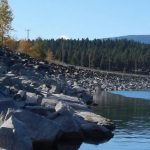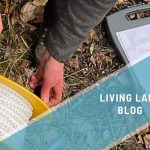Local innovation recognized by RBC
Everyone who lives in the Kootenays knows what a special region it is. Characterized by beautiful mountain rangers, glacier-fed streams, rivers and lakes, critical wetlands, and stunning biodiversity, this part of the world is also being impacted by climate change. Prolonged drought, severe wildfires, and dropping water levels show that it’s time to act now to protect human communities and ecosystems.
Nelson-based Living Lakes Canada is busy collecting the data necessary to help inform local climate adaptation strategies, whether that’s monitoring high elevation streams and lakes, surveying lake shorelines for species at risk habitat, tracking groundwater levels, and assessing aquatic health through biomonitoring.
RBC Tech for Nature, with its mandate to “support new ideas, technologies and partnerships to solve pressing environmental challenges”, has recognized this work with a grant to help accelerate tech-based solutions at the local level.

Nelson RBC staff present the Tech for Nature grant cheque to Living Lakes Canada in front of the Nelson branch. (L-r) ManYing Wong (Mortgage Specialist), Candice Stevenson (Financial Advisor), Bryan Salsbury (Branch Manager), Paige Thurston (Living Lakes Canada CBWMF Program Manager), Amy Kelsch (Dominion Securities Associate Advisor), and Brian Kelsch (Dominion Securities Investment Advisor) with Gretl (office dog). LLC Photo
“In front of the RBC Nelson Branch, the oldest operating RBC branch in B.C., it’s an honour to be able to present this donation from the RBC Foundation to Living Lakes Canada in support of their Innovating Technologies for Watershed Management program,” said Bryan Salsbury. “With this donation, RBC has donated over $1 million to Living Lakes Canada’s regional and national programs since 2015. Climate change is one of the most pressing issues of our time and the important work that Living Lakes Canada undertakes to understand watershed health and to protect our watersheds is crucial. For over two decades, this organization has been researching, collaborating, and influencing decisions to help protect our most important resource.”
Specifically, to help track climate impacts on water, the funding is supporting the Columbia Basin-wide monitoring network that Living Lakes Canada is developing using community feedback to study 31 streams, 15 lakes and 6 climate locations. The Tech for Nature grant is also supporting ongoing upgrades to the Columbia Basin Water Hub database, which is making all the data collected available for watershed management and decision making; and exploration of the use of blockchain technology to guarantee the integrity and relevance of the data for use in community water budgets and governance. Digital tools to host sensitive Traditional Indigenous Knowledge data to promote knowledge sharing and safekeeping are also being explored.
“With support from RBC Tech for Nature, Living Lakes Canada is being empowered to develop innovative tools that will support improved access to water and climate data, enabling communities to make informed decisions for climate adaptation,” said Paige Thurston, Program Manager for Living Lakes Canada’s Columbia Basin Water Monitoring Framework.
To learn more about Living Lakes Canada’s work in the Kootenay region, visit www.livinglakescanada.cbwmf. For information on RBC Tech for Nature, visit www.rbc.com/community-social-impact/climate/environmental-donations.





